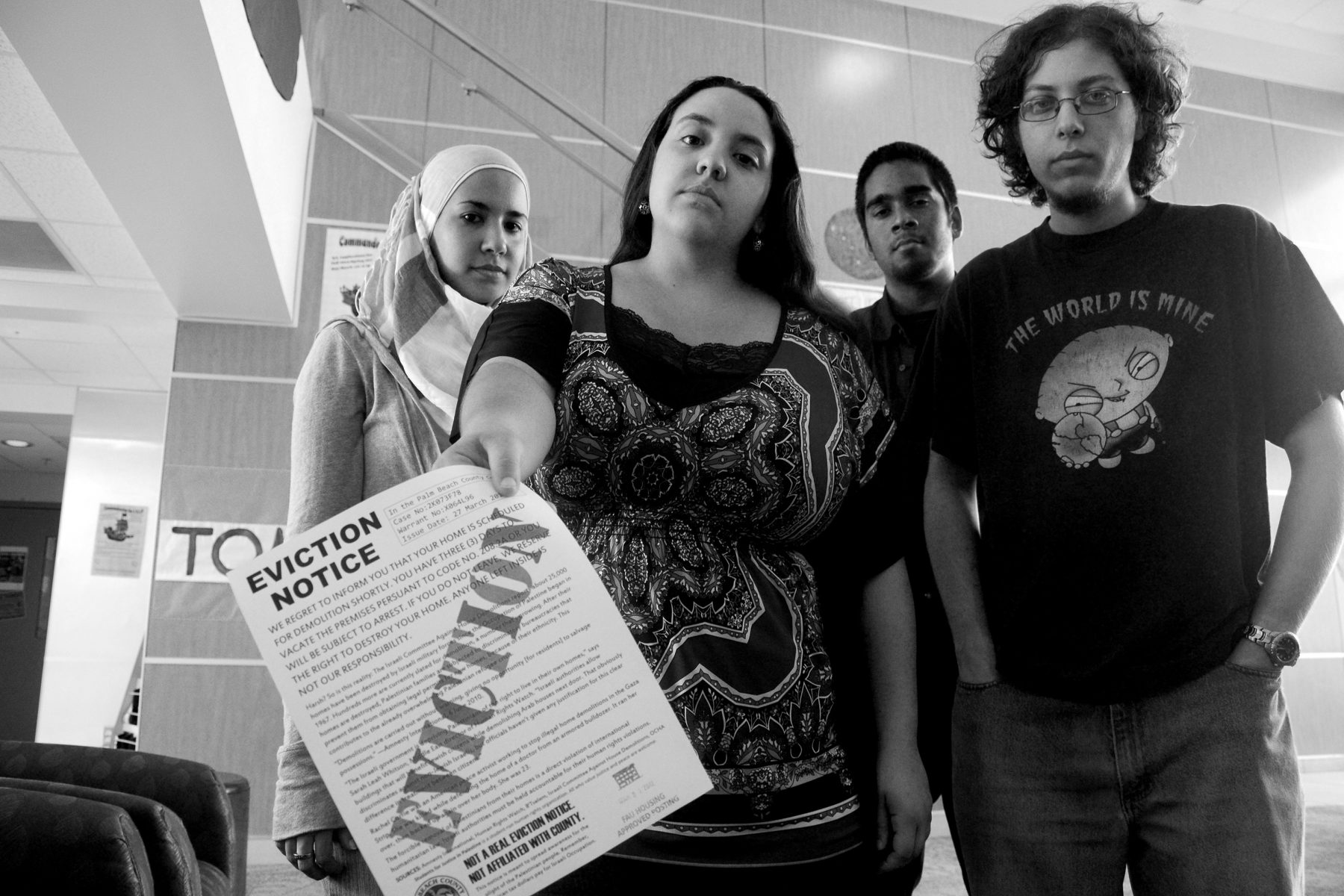In a motion that has incensed free speech advocates across the country, Boston’s Northeastern University has suspended its chapter of Students for Justice in Palestine (SJP) until 2015, after the organization engaged in a leaflet campaign around school dormitories. The university has also pursued disciplinary action, including expulsion proceedings, against two group members. The leaflets were replicas of eviction notices which are routinely posted on Palestinian homes scheduled for Israeli demolition – since 1967, over 26,000 Palestinian homes have been destroyed in order to clear land for Jewish-only settlements. Although the leaflets stated that these notices were replicas and that Northeastern SJP had no known plans to actually demolish student residences, the Northeastern administration opted to ban the organization in response to what they described as a campaign reliant upon the intimidation of their fellow students. If Northeastern SJP plans to petition for reinstatement in 2015, group members will have to attend mandated “civility trainings” and current board members of the group will be prohibited from serving on the inaugural board of the new organization.
The Northeastern incident is one of several university-led attempted suppressions of pro-Palestinian speech in recent weeks. At Columbia College Chicago, a section of Professor Iymen Chehade’s course on the Israeli-Palestinian dispute was canceled by the administration amidst charges of bias in an academic context. The charges arose because Professor Chehade had shared the Oscar nominated documentary 5 Broken Cameras with his students. The film, which depicts the Israeli occupation of the Palestinian village of Bil’in, challenges what Chris Hedges terms “the official Israeli narrative” because it shoulders the responsibility of reporting Israel’s violations of human rights and international law and this, according to Columbia’s administration, constitutes bias. Washington University in St. Louis also censored pro-Palestinian speech when acclaimed slam poet Remi Kanazi – who performed at Bowdoin last April – was forced shortly before a scheduled event at the college to entirely alter the content of his speech on the boycott, divestment, and sanctions movement (BDS) against Israel. And, in response to the growing support surrounding the decision of the American Studies Association to boycott Israeli universities which participate in the illegal occupation of Palestinian territory, legislation is being proposed in several states to, ironically, boycott universities that might support the ASA’s resolution.
According to Ryan Branagan, a member of the now suspended Northeastern SJP, in an interview with The Nation, “Northeastern SJP’s suspension comes at the end of a long line of differential treatment, academic sanctioning, and censorship of our student organization on campus.” Northeastern SJP was put on probation in May 2013 after staging a silent walkout of an event featuring representatives of the Israel Defense Forces, a military body that has been noted for its human rights violations and war crimes by organizations such as Amnesty International and Human Rights Watch. In addition to the probation, which SJP disputed during their hearing and subsequent appeal, the organization was also required to issue a “civility statement” and attend “leadership trainings.” The Northeastern administration claims that the group’s suspension was issued because of both the leaflet campaign as well as violations of the earlier probation—violations which, according to Branagan, SJP “had already been cleared of or found not responsible.”
The recent assaults on pro-Palestinian speech, particularly the events at Northeastern, demonstrate a disturbing trend. When students publicize Israel’s war crimes and human rights violations against the Palestinian people, US universities accuse those students of being intimidating, disruptive, and anti-Semitic. Students for Justice in Palestine, a grassroots Palestinian solidarity organization whose goal is to promote the self-determination of the Palestinian people and their liberation from occupation, is far too often the target of such smear campaigns by Zionists who disapprove of its mission.
Labeling students who criticize Israel as anti-Semitic is a means of stifling discussion and perpetuating Israeli hegemony, and banning those views outright is an alarming abuse of power on the part of university administrators. Many of Northeastern’s donors are vocal Zionists who have expressed their opposition to SJP’s aims, and several people who disagree with the administration’s decision – not just members of Northeastern SJP but a much larger coalition of students and activists – have suggested that the reasons for suspension are financial and political in nature.
If these accusations are correct and pro-Palestinian voices are being silenced on US university campuses for political reasons, it is not just Palestinian solidarity groups who should be concerned but all students, parents, and faculty alike. Northeastern University’s decision regarding SJP designates certain political sentiments as uncivil and therefore deserving of disciplinary action automatically, regardless of whether or not infractions are actually committed. American universities typically proclaim themselves to be bulwarks of the First Amendment principles of free speech and press, and Northeastern is no exception. Attempting to silence student speech due to political pressure is a direct threat to the principles it claims to uphold.
Frustration over the administration’s decision has been widespread, and in response to public backlash, the expulsion charges against two members of SJP have been dropped – although they still face the possibility of “deferred suspension” and the group remains suspended. Nonetheless, Branagan and Northeastern Students for Justice in Palestine refuse to accept the administration’s dogmatism: “I think there’s a clear message being sent to the administration: SJP is not alone in caring about justice in Palestine, free speech on campus or social movements. Singling us out is not only wrong, but futile. The administration will not stop our organizing, nor will it stop free speech. We will fight this unjust attack with every fiber of our being until victory, and we’re never going to stop until our university completely divests from Israeli apartheid.”




